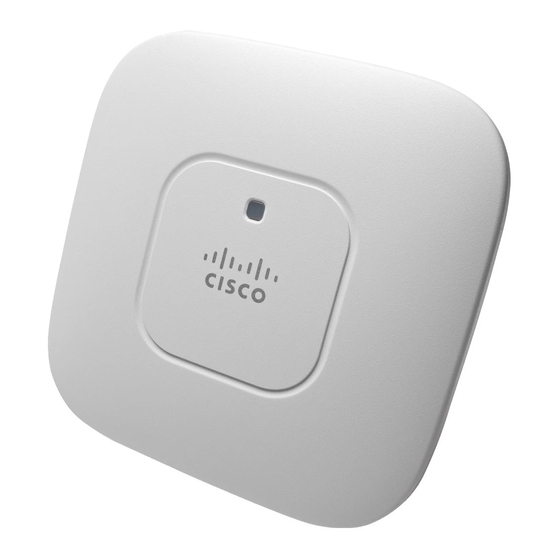Cisco Aironet AIR-SAP702I-A-K9 Manuale introduttivo - Pagina 16
Sfoglia online o scarica il pdf Manuale introduttivo per Punto di accesso wireless Cisco Aironet AIR-SAP702I-A-K9. Cisco Aironet AIR-SAP702I-A-K9 27.

English Translation
When installing the product, please use the provided or designated connection cables/power cables/AC adaptors. Using any
other cables/adaptors could cause a malfunction or a fire. Electrical Appliance and Material Safety Law prohibits the use of
UL-certified cables (that have the "UL" shown on the code) for any other electrical devices than products designated by CISCO.
The use of cables that are certified by Electrical Appliance and Material Safety Law (that have "PSE" shown on the code) is not
limited to CISCO-designated products.
Industry Canada
Canadian Compliance Statement
Models
AIR-CAP702I-A-K9
AIR-SAP702I-E-K9
This Class B Digital apparatus meets all the requirements of the Canadian Interference-Causing Equipment Regulations.
This device complies with Class B Limits of Industry Canada. Operation is subject to the following two conditions:
1. This device may not cause harmful interference, and
2. This device must accept any interference received, including interference that may cause undesired operation.
Cisco Aironet Access Points are certified to the requirements of RSS-210. The use of this device in a system operating either
partially or completely outdoors may require the user to obtain a license for the system according to the Canadian regulations.
For further information, contact your local Industry Canada office.
This device has been designed to operate with antennas having a maximum gain of 5 dBi. Antennas having a gain greater than
5 dBi are strictly prohibited for use with this device. The required antenna impedance is 50 ohms.
To reduce potential radio interference to other users, the antenna type and its gain should be so chosen that the equivalent
isotropically radiated power (EIRP) is not more than that permitted for successful communication.
French Translation
Cet appareil numerique de la classe B respecte les exigences du Reglement sur le material broilleur du Canada.
Cet appareil respecte les limites prescrites pour les appareils de classe B par Industrie Canada. Son utilisation est soumise aux
deux conditions suivantes :
(1) Cet appareil ne doit pas causer d'interf_rences nuisibles, et
(2) Cet appareil doit accepter toutes les interf_rences, y compris celles susceptibles de perturber le fonctionnement de l'appareil.
Les points d'acc_s Aironet de Cisco sont certifi_s conform_ment aux exigences du CNR-210. L'utilisation de cet appareil dans
un syst_me fonctionnant partiellement ou enti_rement ˆ l'ext_rieur peut n_cessiter l'obtention d'une licence pour le syst_me,
conform_ment ˆ la r_glementation canadienne. Pour plus de renseignements, communiquez avec le bureau local d'Industrie
Canada.
Cet appareil a _t_ con_u pour fonctionner avec une antenne d'un gain maximum de 6 dBi. Il est strictement interdit d'utiliser
des antennes ayant un gain sup_rieur ˆ 6 dBi avec cet appareil. L'antenne doit avoir une imp_dance de 50 ohms.
Afin de r_duire le risque d'interf_rence aux autres utilisateurs, le type d'antenne et son gain doivent _tre choisis de fa_on ˆ ce
que la puissance isotrope rayonn_e _quivalente (p.i.r.e.) ne soit pas sup_rieure au niveau requis pour obtenir une communication
satisfaisante.
16
Certification Numbers
2461B-102085
